新湘少版英语六年级上册
- 格式:pptx
- 大小:2.33 MB
- 文档页数:38
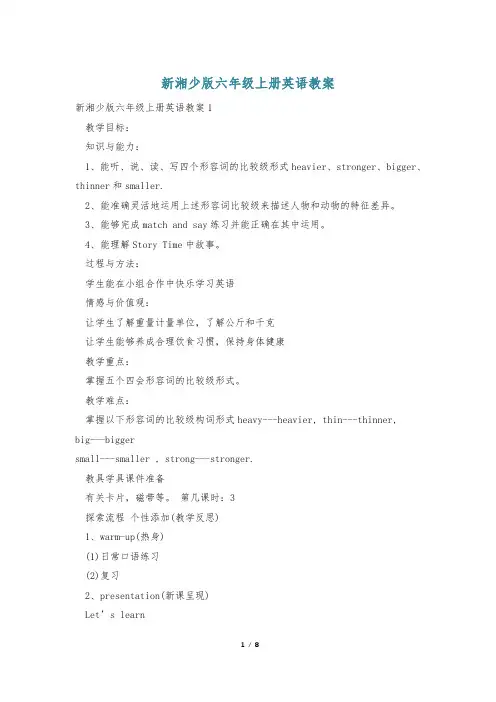
新湘少版六年级上册英语教案新湘少版六年级上册英语教案1教学目标:知识与能力:1、能听、说、读、写四个形容词的比较级形式heavier、stronger、bigger、thinner和smaller.2、能准确灵活地运用上述形容词比较级来描述人物和动物的特征差异。
3、能够完成match and say练习并能正确在其中运用。
4、能理解Story Time中故事。
过程与方法:学生能在小组合作中快乐学习英语情感与价值观:让学生了解重量计量单位,了解公斤和千克让学生能够养成合理饮食习惯,保持身体健康教学重点:掌握五个四会形容词的比较级形式。
教学难点:掌握以下形容词的比较级构词形式heavy---heavier, thin---thinner,big---biggersmall---smaller , strong---stronger.教具学具课件准备有关卡片,磁带等。
第几课时:3探索流程个性添加(教学反思)1、warm-up(热身)(1)日常口语练习(2)复习2、presentation(新课呈现)Let’s learn(1)教师拿出一双大人鞋子一双小孩的鞋子作比较,让一呈现单词bigger和smaller。
(板书bigger和smaller)让学生观察bigger不同。
(2)教师用PPT展示两张胖瘦人照片教授单词thinner和heavier(板书thinner和heavier),让学生观察heavier的不同。
(3)、出示健美教练的照片进而新授单词stronger。
(板书stronger)(4)、教师出示这几个单词卡,让学生比较它们的不同,词卡上又不颜色的笔书写比较级的变化。
(5)、放录音跟读单词。
(6)、学生和自己的同伴自己练习,根据他们的实际情况,并让特征明显的同学上台表演。
看谁做的又快又好。
practice(练习)Match and say教师先示范和一名同学,鼓励学生说出又创意的句子,如:Mike’s fish is bigger than mine.S1:sarah’s fish is(2)story time学生默读后回答,“Who is an excellent goalkeeper?” Why?让学生说出不理解的句子,一块讨论,扫清阅读障碍。
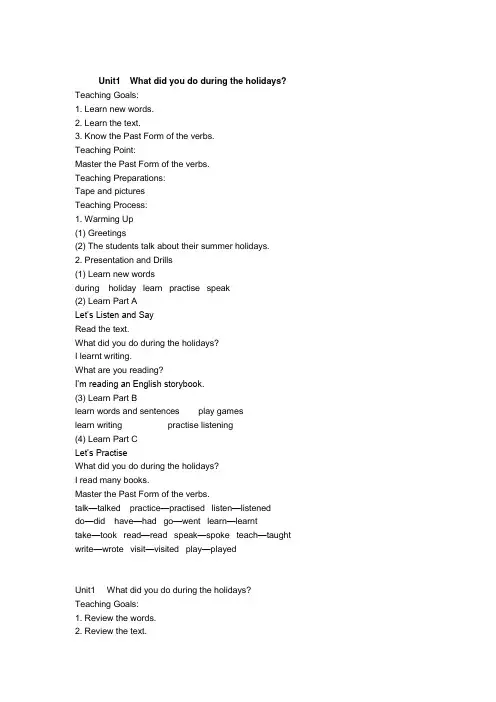
Unit1 What did you do during the holidays? Teaching Goals:1. Learn new words.2. Learn the text.3. Know the Past Form of the verbs.Teaching Point:Master the Past Form of the verbs.Teaching Preparations:Tape and picturesTeaching Process:1. Warming Up(1) Greetings(2) The students talk about their summer holidays.2. Presentation and Drills(1) Learn new wordsduring holiday learn practise speak(2) Learn Part ALet’s Listen and SayRead the text.What did you do during the holidays?I learnt writing.What are you reading?I’m reading an English storybook.(3) Learn Part Blearn words and sentences play gameslearn writing practise listening(4) Learn Part CLet’s PractiseWhat did you do during the holidays?I read many books.Master the Past Form of the verbs.talk—talked practice—practised listen—listened do—did have—had go—went learn—learnt take—took read—read speak—spoke teach—taught write—wrote visit—visited play—playedUnit1 What did you do during the holidays? Teaching Goals:1. Review the words.2. Review the text.3. Review the Past Form.4. Can do the exercises.Teaching Point:Master reading skill.Teaching preparations:Exercises and pictures.Teaching Process:1. Warming Up(1) Greetings(2) Review2. Presentation and Drills(1) Learn Part DLet’s ReadRead the text of Part D.Do the exercises of Part D.Talk about Part D.(2) Learn Part ELet’s WriteWrite down your answers.What did you do during the summer holidays?I went .What did you learn?I learnt .What did you read?I read .What did you listen to?.What did you write?.(3) Learn Part FLet’s Have Fun.Talk about your holidays.Unit2 Katie always gets up early. Teaching Goals:1. Learn new words.2. Learn the text.3. Master the Third Person Singular. Teaching Point:Master the Third Person Singular.Teaching Preparations:Tape and pictures.Teaching Process:1. Warming Up(1) Greetings(2) Review2. Presentation and Drills(1) Learn new words.always weekday often afterwave return sometimes never(2) Learn Part ALet’s listen and SayKatie’s day1>Read the text.Katie always gets up early.Katie returns home at 5:00 p.m.She plays chess with her father after dinner.2>The Third Person Singularget—gets have—has wave—waves go—goes return—returns do—does play—plays3>Short Phrasesget up have breakfast go to schoolreturn home do homework play chess(3) Learn Part Bwave goodbye be late for school do her homework read a newspaper play chess take a walk(4) Learn Part CLet’s PractiseGroup work. Talk about Peter’s activities.Unit2 Katie always gets up early.Teaching Goals:1. Review the words.2. Review the text.3. Review the Third Person Singular.4. Can do the exercises.Teaching Point:Master reading skill.Teaching Preparations:Exercises and picturesTeaching Process:1. Warming Up(1) Greetings(2) Review2. Presentation and Drills(1) Learn Part DLet’s ReadRead the text of Part D.Do the exercises of Part D. Talk about Part D.(2) Learn Part ELet’s WriteFill in the blanks.I always .I often .I sometimes .I never .(3) Learn Part FLet’s Have FunLet’s rhyme.The snail says,” I feel nice,I love my shell.When I see mice,I go into my shell,I always carry my hou se about.”The bird says,” I’m always free! I’m never sad!I like the tree.Resting on my nest is not bad.”Unit3 I like my computer Teaching Goals:1. Learn new words.2. Learn the text.3. Master the Past Form. Teaching Point:Master the Past Form. Teaching Preparations:Tape and pictures Teaching Process:1. Warming Up(1) Greetings(2) Review2. Presentation and Drills(1) Learn new wordssearch find out about worldemail send greeting(2) Learn Part ALet’s listen and Say1>Read the text.I like my computer.It’s very fast.It will help you a lot.You can also find out about countries in the world. Let’s try it now.2>The Past Formbuy—bought is—wascan—could see—saw(3) Learn Part BLet’s Learnemail my friends send greetingssearch for a lot of things find out about countries (4) Learn Part CLet’s PractiseWhat can we do on the computers?We can email each other.We can send greetings to our friends.We can search for a lot of things.Unit3 I like my computerTeaching Goals:1. Review the words.2. Review the text.3. Review the Past Form.4. Can do the exercises.Teaching Point:Master reading skill.Teaching Preparations:Exercises and picturesTeaching Process:1. Warming Up(1) Greetings(2) Review2. Presentation and Drills(1) Learn Part D.Let’s ReadRead the text of Part D.Do the exercises of Part D.Talk about Part D.(2) Learn Part E.Let’s WriteWrite on email to your friend. Tell him/ her what you did lastSunday.Dear ,Last Sunday, I had a wonderful day. I played with my friends9:00 a.m. After the games, I my homework onthe computer. The teacher emailed us about homework. It’s easy to homework this way. In the afternoon, I a short cartoon film on the computer.That’s all for now.Regards,(3) Learn Part FLet’s Have FunLook and make.Let’s Know MoreTeaching Goal:Know something about travelling around China.Teaching Point:Know something about travelling.Teaching Preparations:Some important informations and picturesTeaching Process:1. Warming UpGreetings2. Presentation and Drills(1) Read the text on Page 13.Changsha South Railway StationA bus station in ChengduShanghai Pudong AirportTianjin Port(2) Talk about your travelling during the summer holidays.Assessment ⅠTeaching Goals:1. Review the last class.2. Can do the exercises.Teaching Point:Do the exercises.Teaching Process:1. Warming UpGreetingsReview2. Presentation and Drills(1) Listen and tick(2) Listen and circle(3) Read and fill in the blanks(4) Read and write(5) I can do it(6) I like to do itUnit4 The Mid—Autumn Festival is comingTeaching Goals:1. Learn new words.2. Learn the text.3. Know the Mid—Autumn Festival.Teaching Point:Know the Mid—Autumn Festival.Teaching Preparations:Tape and picturesTeaching Process:1. Warming Up(1) Greetings(2) Review2. Presentation and Drills(1) Learn new wordsthe Mid—AutumnFestival nearby centre mooncake type lotus seed bean taste (2) Learn Part ALet’s listen and SayRead the text.The Mid—Autumn Festival is coming.Mrs Li and her son, Binbin, go shopping at the nearby shopping centre. Which type do you like?I like the ones with lotus seeds.How much is a box of mooncakes?(3) Learn Part BLet’s learnmooncake nuts lotus seed red bean(4) Learn Part CLet’s PractiseI enjoy eating the lotus seed mooncakes.I enjoy looking at the moon.I enjoy reading poems when looking at the moon.I enjoy drinking tea.Unit4 The Mid—Autumn Festival is comingTeaching Goals:1. Review the words.2. Review the text.3. Can do the exercises.Teaching Point:Master reading skill.Teaching Preparations:Exercises and picturesTeaching Process:1. Warming Up(1) Greetings(2) Review2. Presentation and Drills(1) Learn Part DLet’s ReadRead the text of Part D.Do the exercises of Part D.Talk about Part D.(2) Learn Part ELet’s WriteYesterday was the Mid—Autumn Festival. You had a good time in the evening. What did your family do? Write about it.We celebrated the Mid—Autumn Festival at home. Weand . We enjoyedand . My grandfather told .We were very interested in them.(3) Learn Part FLet’s Have FunIn the moze on the book, find out what each person has to celebrate the Mid—Autumn Festival.Unit5 It will be sunny and cool tomorrowTeaching Goals:1. Learn new words.2. Learn the text.3. Master the Future Tense.Teaching Point:Master the Future Tense.Teaching Preparations:Tape and picturesTeaching Process:1. Warming Up(1) Greetings(2) Review2. Presentation and Drills(1) Learn new wordsforecast clear light rain heavy(2) Learn Part ALet’s Listen and SayRead the text.It’s time for the weather forecast.Tomorrow will be clear in Beijing.It will be sunny and cool.There will be a strong wind in Xi’an.It will rain tomorrow in Changsha.But it won’t be heavy.It will be sunny and warm in Sanya.(3) Learn Part BLet’s Learnweather forecast light rain sunny and warmstrong wind heavy rain sunny and cool light snow (4) Learn Part CLet’s PractiseIt will be sunny tomorrow.There will be a light snow next Friday.Unit5 It will be sunny and cool tomorrowTeaching Goals:1. Review the words.2. Review the text.3. Review the Future Tense.Teaching Point:Master reading skill.Teaching Preparations:Exercises and picturesTeaching Process:1. Warming Up(1) Greetings(2) Review2. Presentation and Drills(1) Learn Part DLet’s ReadRead the text of Part D.Do the exercises of Part D.Talk about Part D.(2) Learn Part ELet’s WriteRead and writeTomorrow will be in Changsha.There will be in .It will be .It will .(3) Learn Part FLet’s Have FunLet’s sing the song “Itsy Bitsy Spider”Unit6 I will bring a big bottle of orange juice Teaching Goals:1. Learn new words.2. Learn the text.3. Master the future tense.Teaching Point:Master the future tense.Teaching Preparations:Tape and picturesTeaching Process:1. Warming Up(1) Greetings(2) Review2. Presentation and Drills(1) Learn new wordsbring bottle picnic fruit barpeanut candy wait can(2) Learn Part ALet’s Listen and S ayRead the text.Autumn is coming. The weather is getting cool and nice. What are we going to bring for the picnic?I will bring a big bottle of orange juice.I will bring some peanuts and candies.(3) Learn Part BLet’s Learna bottle of orange juice a box of cakesa few cans of Coke a few bars of chocolatebring meet peanut fruit candy(4) Learn Part CLet’s PractiseI will bring a bottle of orange juice.I will bring a few cans of Coke.I will bring a can of Coke.I will bring three bottles of milk.Unit6 I will bring a big bottle of orange juice.Teaching Goals:1. Review the words.2. Review the text.3. Review the future tense.4. Can do the exercises.Teaching Point:Master reading skill.Teaching Preparations:Exercises and picturesTeaching Process:1. Warming Up(1) Greetings(2) Review2. Presentation and Drills(1) Learn Part DLet’s ReadRead the text of Part D.Do the exercises of Part D.Talk about Part D.(2) Learn Part ELet’s WriteLingling’s family wants to go to the beach for a picnic. Write down what her family will bring to the beach.Lingling’s father will .Lingling’s mother .Dongdong .Lingling .(3) Learn Part FLet’s Have FunLook at the pictures on the book and write down the items.Let’s Know MoreTeaching Goals:Know something about picnic.Teaching Point:Know something about picnic.Teaching Preparations:Important informations and picturesTeaching Process:1. Warming UpGreetings2. Presentation and Drills(1) Read the text on Page 29.(2) Some picnics and partiesTeddy Bears’ Picnic (USA)Easter Egg Hunt (UK)Beach party ( Australia)Assessment ⅡTeaching Goals:Can do the exercises.Teaching Point:Do the exercises.Teaching Preparation:TapeTeaching Process:1. Warming UpGreetings2. Presentation and Drills(1) Listen and circle(2) Listen and number(3) Look and write(4) Read and write(5) I can do it(6) I like to do itUnit 7 What can I do?Teaching Goals:1. Learn new words.2. Learn the text.3. Master the sentence pattern” What can…..do?”Teaching Point:Master the sentence pattern” What can….do?”Teaching Preparations:Tape and picturesTeaching Process:1. Warming Up(1) Greetings(2) Review2. Presentation and Drills(1) Learn new wordsweak slow(2) Learn Part ALet’s Listen and SayRead the text.The children want to help old people.I can make tea or coffee for them.What can I do?I can clean their houses.I can sing to them and make them happy.(3) Learn Part BLet’s Learnan old woman help old people on the road make tea make cakesclean their homes make them happy(4) Learn Part CLet’s PractiseWhat can I do?I can make them happy.I can help them on the road.Unit 7 What can I do?Teaching Goals:1. Review the words.2. Review the text.3. Review the sentence pattern” What can…..do?”4. Can do the exercises.Teaching Point:Master reading skill.Teaching Preparations:Exercises and picturesTeaching Process:1. Warming Up(1) Greetings(2) Review2. Presentation and Drills(1) Learn Part DLet’s ReadRead the text of Part D.Do the exercises of Part D.Talk about Part D.(2) Learn Part ELet’s WriteI can help old people .I am going to tell them .I would like to .I can .I like to .(3) Learn Part FLet’s Have FunLet’s chant.Every day, he sits there alone.No one cares. No one comes near.His heart is cold, like a stone.But he will have some happy tearsWhen you simply say” Hello.”Unit 8 We shouldn’t waste water Teaching Goals:1. Learn new words.2. Learn the text.3. Master the sentence pattern “We shouldn’t ……”Teaching Point:Master the sentence pattern “We shouldn’t ……”Teaching Preparations:Tape and picturesTeaching Process:1. Warming Up(1) Greetings(2) Review2. Presentation and Drills(1) Learn new wordsshould shouldn’t= should not waste blouse enough save drop fresh(2) Learn Part ALet’s Listen and SayRead the text.What are you doing?I’m washing my blouse.We shouldn’t waste water.Why? You need water.Everyone needs water.(3) Learn Part BLet’s Learnkeep the rivers clean keep the air clean and fresh plant more trees use bikes instead of cars shouldn’t kill wild anim alsshouldn’t waste water shouldn’t litter(4) Learn Part CLet’s PractiseWe should plant more trees.We shouldn’t waste water.We shouldn’t kill wild animals.Unit 8 We shouldn’t waste water.Teaching Goals:1. Review the words.2. Review the text.3. Review the sentence pattern “ We shouldn’t….”4. Can do the exercises.Teaching Point:Master reading skill.Teaching Preparations:Exercises and picturesTeaching Process:1. Warming Up(1) Greetings(2) Review2. Presentation and Drills(1) Learn Part DLet’s ReadRead the text of Part D.Do the exercises of Part D.Talk about Part D.(2) Learn Part ELet’s WriteLook at the picture on the book. Write a few sentences about it.There are on the road.We can go to school or .In the morning many people go to work .In the evening many people .(3) Learn Part FLet’s Have FunGet some pictures like those on the book.Talk about the pictures.Work in groups. Design a poster. Use the words “ should “ and “ shouldn’t”.Unit 9 This bird is bigger than the first oneTeaching Goals:1. Learn new words.2. Learn the text.3. Master the Comparative/ Superlative form of adj. and adv.Teaching Point:The Comparative/ Superlative form of adj. and adv.Teaching Preparations:Tape and picturesTeaching Process:1. Warming Up(1) Greetings(2) Review2. Presentation and Drills(1) Learn new wordsthan clay(2) Learn Part ALet’s Listen and SayRead the text.Children’s clay art is on show at Sunshine school.This is the first one. It’s a small bird.This is the second one.This bird is bigger than the first one.Look at the third bird!It’s bigger than the second one.(3) Learn Part BLet’s Learnbig—bigger—biggest small—smaller—smallesttall—taller—tallest short—shorter—shortest long—longer—longest(4) Learn Part CLet’s PractiseTom is taller than Mike.Tom’s hair is shorter than Mike’s.Unit 9 This bird is bigger than the first oneTeaching Goals:1. Review the words.2. Review the text.3. Review the Comparative/ Superlative degree of adj. and adv..4. Can do the exercises.Teaching Point:The Comparative/ Superlative degree of adj. and adv.. Teaching Preparations:Exercises and picturesTeaching Process:1. Warming Up(1) Greetings(2) Review2. Presentation and Drills(1) Learn Part DLet’s ReadRead the text of Part D.Do the exercises of Part D.Talk about Part D.(2) Learn Part ELet’s WriteFill in the blanks.Peter is . David runs .Peter runs . Peter can jump .David can . John .(3) Learn Part FLet’s Have FunLet’s chantThe giraffe says, “ I am taller.”The little rabbit says, “I am faster.”The elephant says, “I am bigger.”The monk ey says, “I am smarter.”The lion says, “I roar louder!And I feel prouderThan you!”Let’s Know MoreTeaching Goals:Master the Comparative degree of adj. and adv.. Teaching Point:The Comparative degree of adj. and adv.. Teaching Preparation:Important informations and pictures.Teaching Process:1. Warming UpGreetings2. Presentation and Drills(1) Read the text on Page 45.(2) Let’s CompareWhich is faster?Which is higher?Which is older?Assessment ⅢTeaching Goals:Can do the exercises.Teaching Point:Do the exercises.Teaching Preparation:TapeTeaching Process:1. Warming UpGreetings2. Presentation and Drills(1) Listen and tick(2) Listen and circle(3) Look, read and match(4) Look, read and write(5) I can do it(6) I like to do itUnit 10 I don’t feel well today Teaching Goals:1. Learn new words.2. Learn the text.3. Can use English to express your feelings.Teaching Point:Express feelings in English.Teaching Preparations:Tape and picturesTeaching Process:1. Warming Up(1) Greetings(2) Review2. Presentation and Drills(1) Learn new wordsfeel well cough headachefever medicine rest just(2) Learn Part ALet’s Listen and SayRead the text.Anne doesn’t feel well today. Her mother takes her to see a doctor. What’s wrong with you?I feel cold and I have a cough.(3) Learn Part BLet’s Learndon’t feel well have a coughhave a headache have a fevertake medicine have a good rest(4) Learn Part CLet’s PractiseWhat’s wrong with you?I have a cough.I have a headache.Unit 10 I don’t feel well todayTeaching Goals:1. Review the words.2. Review the text.3. Can do the exercises.Teaching Point:Master reading skill.Teaching Preparations:Exercises and picturesTeaching Process:1. Warming Up(1) Greetings(2) Review2. Presentation and Drills(1) Learn Part DRead the text of Part D.Do the exercises of Part D.Talk about Part D.(2) Learn Part ELet’s writeAnne is in bed now. She can’t go to school today. Write a letter to tell her teacher that she’s ill.(3) Learn Part FLet’s Have FunDino is in bed. He feels sad and lonely.Work in groups and make cards for Dino.Unit 11 Shall we go to the theatre? Teaching Goals:1. Learn new words.2. Learn the text.3. Master the sentence pattern “Shall we go to…..?”Teaching Point:The sentence pattern “Shall we go to…….?”Teaching Preparations:Tape and picturesTeaching Process:1. Warming Up(1) Greetings(2) Review2. Presentation and Drills(1) Learn new wordstheatre call plan ideaplay concert hall film(2) Learn Part ALet’s Listen and SayToday is Saturday. Dongdong is calling Anne. They’re talking about the plan for the day.Shall we go to the cinema today?What time shall we meet?(3) Learn Part BLet’s Learncinema theatre concert hallsee a film see a play enjoy the music (4) Learn Part CLet’s PractiseShall we go to the theatre?Let’s see a play.Unit 11 Shall we go to the theatre? Teaching Goals:1. Review the words.2. Review the text.3. Review the sentence pattern.4. Can do the exercises.Teaching Point:Master reading skill.Teaching Preparations:Exercises and picturesTeaching Process:1. Warming Up(1) Greetings(2) Review2. Presentation and Drills(1) Learn Part DRead the text of Part D.Do the exercises of Part D.Talk about Part D.(2) Learn Part ELet’s WriteYou and your friends had a good time today. You went to some places and took many photos. You enjoyed yourselves.Write about what you did in the diary.(3) Learn Part FLet’s Have FunLet’s sing the song “Do—Re—Mi”Unit 12 It’s Christmas again!Teaching Goals:1. Learn new words.2. Learn the text.3. Know something about Christmas.Teaching Point:Know something about Christmas.Teaching Preparations:Tape and picturesTeaching Process:1. Warming Up(1) Greetings(2) Review2. Presentation and Drills(1) Learn new wordsChristmas decorate colourful lightPresent dress up Santa Claus receivemerry greet(2) Learn Part ALet’s Listen and SayRead the text.Christmas falls on 25th December.Anne’s family celebrates Christmas.(3) Learn Part BLet’s LearnChristmas tree Christmas card presentSanta Claus celebrate decorate receive greet (4) Learn Part CLet’s PractiseHere’s a present for you.Here’s a Christmas card for you.Unit 12 It’s Christmas again!Teaching Goals:1. Review the words.2. Review the text.3. Can do the exercises.Teaching Point:Master reading skill.Teaching Preparations:Exercises and picturesTeaching Process:1. Warming Up(1) Greetings(2) Review2. Presentation and Drills(1) Learn Part DRead the text of Part D.Do the exercises of Part D.Talk about Part D.(2) Learn Part ELet’s WriteFill in the form.Christmas The Spring FestivalDateDecorationsPresentsActivities(3) Learn Part FLet’s Have FunLet’s sing the song “We Wish You a Merry Christmas.”Let’s Know MoreTeaching Goals:Know something about theatre.Teaching Point:Know something about theatre.Teaching Preparations:Important informations and picturesTeaching Process:1. Warming UpGreetings2. Presentation and Drills(1) Read the text on Page 61.(2) Theatre ShowsBeijing operaShadow puppet show in Xi’anBroadway show in New YorkAssessment ⅣTeaching Goals:Can do the exercises.Teaching Point:Do the exercises.Teaching Preparation:TapeTeaching Process:1. Warming UpGreetings2. Presentation and Drills(1) Listen and circle(2) Listen and write(3) Read and fill in the blanks(4) Look and write(5) I can do it(6) I like to do it(7) Let’s Read More。
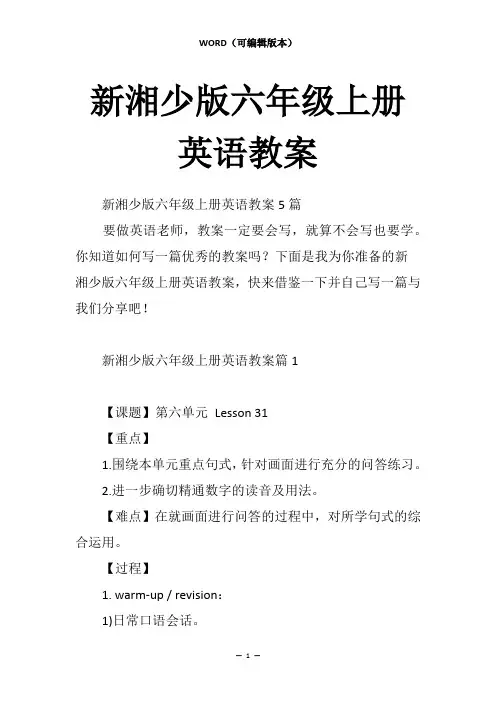
新湘少版六年级上册英语教案新湘少版六年级上册英语教案5篇要做英语老师,教案一定要会写,就算不会写也要学。
你知道如何写一篇优秀的教案吗?下面是我为你准备的新湘少版六年级上册英语教案,快来借鉴一下并自己写一篇与我们分享吧!新湘少版六年级上册英语教案篇1【课题】第六单元Lesson 31【重点】1.围绕本单元重点句式,针对画面进行充分的问答练习。
2.进一步确切精通数字的读音及用法。
【难点】在就画面进行问答的过程中,对所学句式的综合运用。
【过程】1. warm-up / revision:1)日常口语会话。
2)游戏:猜猜数字:一个学生心里想一个数字,其他学生猜测:学生问:Is it …?这个同学根据别的同学的猜测进行判断,并用UP / DOWN 来提示。
看谁能够最先猜出这个数字。
在学生游戏过程中,教师要注意引导,纠正学生不正确的发音。
3)读一读:教师出示单词卡片,学生齐读或个人读单词,教师纠正发音。
教师注意倾听学生-teen和-ty 的读音。
4)听一听:教师口述,学生写出听到的数字。
2. Learn to say:1)学生打开书看一分钟,注意观察画面。
2)合上书,回忆你在画面上看到了什么?What did you see in the picture? 锻炼学生记忆力。
3)四个人为一个小组,相互交流曾看到了什么。
Please talk about what you see in the pictures in you groups.4)学生叙述看到的.东西,教师播放与课文配套的影片。
教师根据学生叙述的进程,点击画面,出现一些实物场景或图片。
教师引导学生回答:How many … are there in the picture?Where are they?教师提问:What colour is it / are they?回答后,再播放一遍影片。
5)教师此时可以面向学习上有困难的学生提问,引导他们复习提问的方法。

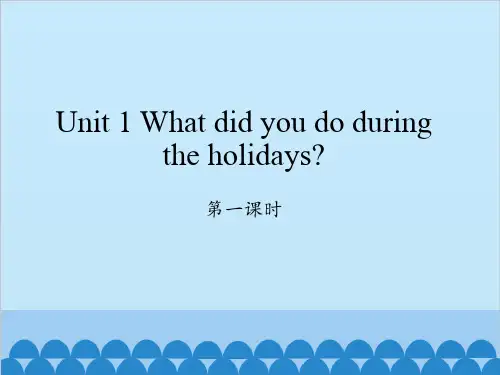
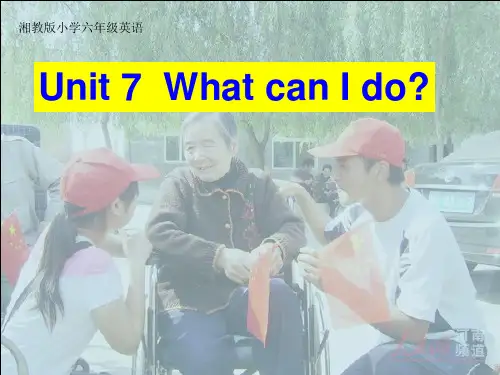
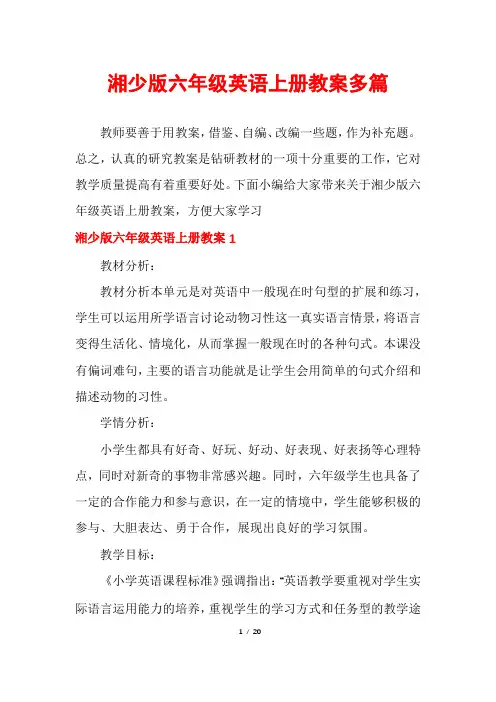
湘少版六年级英语上册教案多篇教师要善于用教案,借鉴、自编、改编一些题,作为补充题。
总之,认真的研究教案是钻研教材的一项十分重要的工作,它对教学质量提高有着重要好处。
下面小编给大家带来关于湘少版六年级英语上册教案,方便大家学习湘少版六年级英语上册教案1教材分析:教材分析本单元是对英语中一般现在时句型的扩展和练习,学生可以运用所学语言讨论动物习性这一真实语言情景,将语言变得生活化、情境化,从而掌握一般现在时的各种句式。
本课没有偏词难句,主要的语言功能就是让学生会用简单的句式介绍和描述动物的习性。
学情分析:小学生都具有好奇、好玩、好动、好表现、好表扬等心理特点,同时对新奇的事物非常感兴趣。
同时,六年级学生也具备了一定的合作能力和参与意识,在一定的情境中,学生能够积极的参与、大胆表达、勇于合作,展现出良好的学习氛围。
教学目标:《小学英语课程标准》强调指出:“英语教学要重视对学生实际语言运用能力的培养,重视学生的学习方式和任务型的教学途1/ 20径,发展学生的综合语言运用能力。
” 根据以上要求及对学生实际情况的分析,我制定了如下教学目标。
(一)知识与技能:引导学生运用一般现在时的句子介绍动物习性。
(二)过程与方法:学生通过小组合作,组内讨论,组间交流,培养学生自主学习和运用语言的能力。
(三)情感态度与价值观:通过了解动物与人类的和谐关系,激发学生热爱动物的情感和自觉保护动物的意识。
教学策略:(一)教学方式与学习方式[教学方式:“任务型”教学方式学习方式:自主探究、合作交流] 本课的设计中,我运用了“任务型”教学方式,要求学生通过表达、询问、解释、沟通、交涉、协商等多种语言活动形式来完成任务,同时注重英语中听、说、读、写各项基本技能的训练;英语课程标准强调重视学生实际语言运用能力的培养,倡导体验、实践、参与、合作与交流的学习方式。
学生将在“任务型”教学方式的引导下,在自主探究与合作交流中学习和运用语言。
(二)评价方式[评价方式:多元性评价] 心理学家指出:学生在课堂上有获得表扬的需要,评价的主体应该是多元性的。
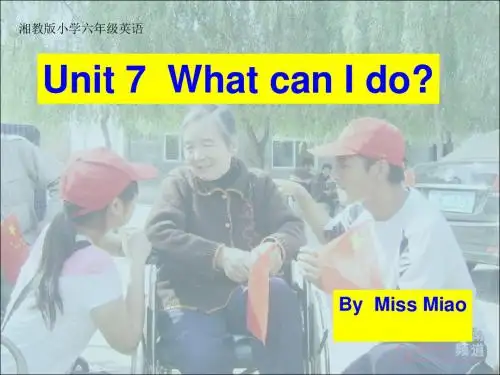
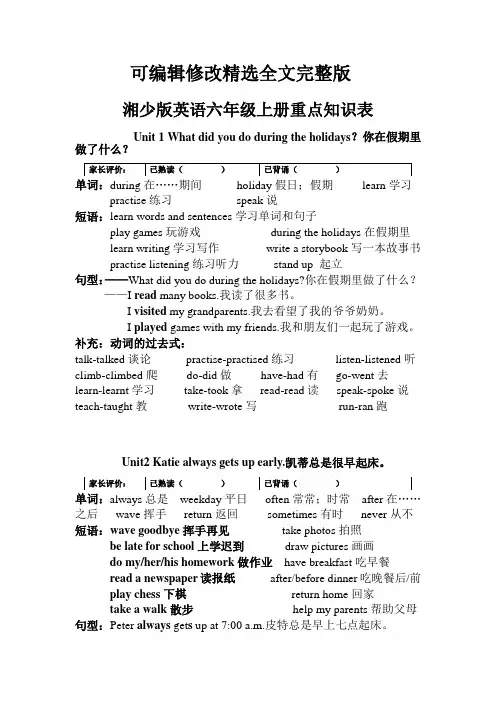
可编辑修改精选全文完整版湘少版英语六年级上册重点知识表Unit 1 What did you do during the holidays ?你在假期里做了什么?单词:during 在……期间 holiday 假日;假期 learn 学习practise 练习 speak 说短语:learn words and sentences 学习单词和句子play games 玩游戏 during the holidays 在假期里learn writing 学习写作 write a storybook 写一本故事书practise listening 练习听力 stand up 起立句型:——What did you do during the holidays?你在假期里做了什么? ——I read many books.我读了很多书。
I visited my grandparents.我去看望了我的爷爷奶奶。
I played games with my friends.我和朋友们一起玩了游戏。
补充:动词的过去式:talk-talked 谈论 practise-practised 练习 listen-listened 听 climb-climbed 爬 do-did 做 have-had 有 go-went 去learn-learnt 学习 take-took 拿 read-read 读 speak-spoke 说teach-taught 教 write-wrote 写 run-ran 跑Unit2 Katie always gets up early.凯蒂总是很早起床。
单词:always 总是 weekday 平日 often 常常;时常 after 在……之后 wave 挥手 return 返回 sometimes 有时 never 从不 短语:wave goodbye 挥手再见 take photos 拍照be late for school 上学迟到 draw pictures 画画do my/her/his homework 做作业 have breakfast 吃早餐read a newspaper 读报纸 after/before dinner 吃晚餐后/前 play chess 下棋 return home 回家take a walk 散步 help my parents 帮助父母 句型:Peter always get s up at 7:00 a.m.皮特总是早上七点起床。
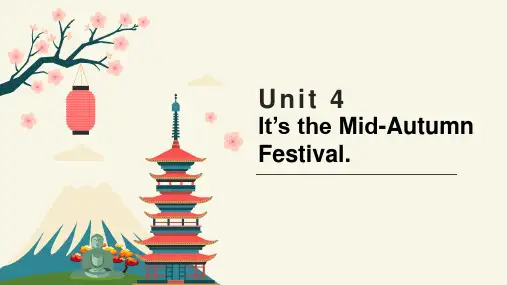
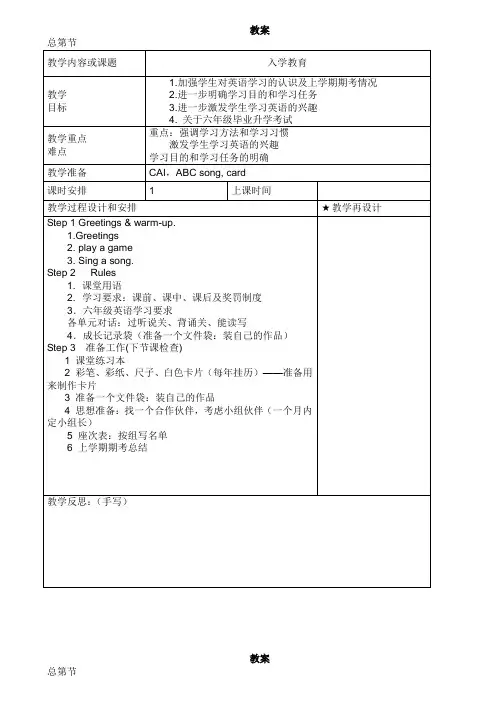
全新湘少版六年级英语上册知识归纳(全册)Unit1★动词过去式变化规律:1.一般情况下,直接在动词词尾加ed.如:talk—talked说listen—listened听play—played玩climb—climbed爬2.以不发音的e结尾,在动词词尾加d.如:practise—practised练习3.以辅音字母加y结尾的动词,变y为i再加ed.如:study—studied学习,研究4.以一个辅音字母结尾的重读闭音节词,双写最后一个辅音字母,再加ed.如:stop—stopped停止5.不规则动词没有规律,需要特殊记。
如:do-did have—had go—went learn—learnt take—took read—read speak—spoke teach—taught stand—stood sit—sat say—said run—ranis,am—was are—were write--wrote★单词、短语during在…期间holiday假期learn words and sentences学习单词和句子play games玩游戏learn writing学习写作practice listening练习听力★句子时态:一般过去时,表示过去某个时间里发生的动作或存在的状态。
主要有动词的过去式来体现,其标志词是过去的时间。
如:yesterday昨天last night昨晚last week上周last year 去年等等。
1.What did you do during the holidays?假期间你做了什么?--I read many books./I learnt writing./I wrote a little storybook in English./I visited my grandparents.Unit2★单词、短语weekday工作日after在…之后before在..之前always总是,经常often时常sometimes有时never从不wave goodbye挥手再见be late for school上学迟到read a newspaper读报纸play chess下棋take a walk散步get up起床have/has breakfast吃早餐return home回家★句子时态:一般现在时:表示经常,反复发生的动作或存在的状态。
Unit one What did you do during the holiday?Period 1Teaching targets.1.The target of knowledge:1) Learn these new words: slide, bench, bark, chain, swing2) Learn these sentences: be doing sth.2.The targets of skills:1) Can understand the four - skill words.2) Can understand the sentence structure.3) Can describe the other 's actions.3.The targets of emotion:To love the living surrounding.Main points :The new words and sentences.Difficult point:Can describe the other 's actions.Teaching method and Learning way:CAITeaching aids :cards, tape ,recordTeaching Process:Step 1 Warming upGreetings.Learn to sing a songUse the cards to go over the new dialogueGame—Quick responseRetell the storyStep2 Presentation and drill1. T : Hello,boys and girls ,,nice to meet you again,today is the firstday of this term.let 's go to a park and have a look,what will happen in the park! Show a picture of a park ,learn the new wordsA swingShow a swing and says : This is a swing ,let 's put it in t he park,write the word on the blackboard.Leads reading the new word2. Show the pictures and put them on the picture (in the park),and learn to say thewords.3. Leads reading the words,and requires the pupils to act as a little teacher,leads reading4. Look and say: High and low voiceStep3 Fast reading and listening1) Show the picturesT introduces the situation and requires the pupils to read the dialogue by themselves2) Listen and repeat ,leads reading3) Listen and imitationStep4 Instive doingReading the dialogue carefullyListen and repeat the dialogueRetell the story ,check the resulPeriod 2Teaching targets.1) Consolidate these new words: slide, bench, bark, chain, swing2) Can master these sentences: be doing sth3) Can retell the story2.The targets of emotion:To love the living surrounding.Main points :The new words and sentences.Difficult point:Can describe the other ‘s actions.retell the storyTeaching aids :cards, tape ,recordTeaching Process:Step 1 Warming up Greetings.Learn to sing a songUse the cards to go over the new dialogueGame—Quick responseRetell the storyStep2 Presentation and drill1. T :Let 's listen and repeat the story togetherShow the new words ,requires the pupils to read ,go over the words.Teacher explin the grammarfor the pupils ,and asks them to makesentences with the present time am/is/are +doingStep3 Practice1) Show the picturesT introduces the situation and requires the pupils to read the dialogue by themselves2) Listen and repeat ,leads reading3) Listen and imitationStep 4 Consolidation1) Make a situation and have a dialogue with their partners, choose some to act it outA: Sports meeting ,the children are watching the athletes. They're talking about the sports .2) EstimationStep 5 作业布置( Homework)1. 听1 课录音,每天15分钟。
2023学年湘少版六年级英语上册全一册教案一、教学目标1.熟练掌握六年级英语上册单元的词汇和句型;2.能够流利地运用所学的词汇和句型进行听说读写;3.培养学生的英语学习兴趣,提高听说读写能力。
二、教学内容本教案涵盖六年级英语上册全一册的所有内容,包括以下单元:1.Unit 1: Greetings2.Unit 2: Hobbies3.Unit 3: School Life4.Unit 4: Family5.Unit 5: Food and Drinks6.Unit 6: Daily Routine7.Unit 7: My City8.Unit 8: Weather9.Unit 9: Festivals10.Unit 10: Travel三、教学步骤1. Unit 1: Greetings词汇:•Hello•Hi•Good morning•Good afternoon•Good evening•How are you?•I’m fine, thank you.•Nice to meet you.•What’s your name?•My name is…句型:•Hello, class.•Good morning, teacher.•How are you, Tom?•I’m fine, thank you.教学步骤:1.学习并练习问候语和常用句型;2.听录音并跟读;3.分组练习对话,模拟真实情境。
2. Unit 2: Hobbies词汇:•play basketball•swim•draw•sing•dance•read books•watch TV•play computer games句型:•What’s your hobby?•My hobby is…教学步骤:1.学习并练习不同的爱好词汇;2.进行听说练习,用句型询问和回答关于爱好的问题;3.分组活动,让学生展示自己的爱好。
3. Unit 3: School Life词汇:•classroom•teacher•students•blackboard•desk•chair•backpack•pencil•eraser句型:•This is a classroom.•That is a blackboard.•I have a pencil.教学步骤:1.学习和复习学校生活相关的词汇;2.进行听说练习,描述和指认校园里的物品;3.进行小组活动,模拟校园生活场景。
2024新湘少版六年级上册英语教案(实用版)编制人:__________________审核人:__________________审批人:__________________编制单位:__________________编制时间:____年____月____日序言下载提示:该文档是本店铺精心编制而成的,希望大家下载后,能够帮助大家解决实际问题。
文档下载后可定制修改,请根据实际需要进行调整和使用,谢谢!并且,本店铺为大家提供各种类型的实用资料,如工作总结、工作报告、文案策划、工作计划、作文大全、教案大全、演讲稿、其他资料等等,想了解不同资料格式和写法,敬请关注!Download tips: This document is carefully compiled by this editor.I hope that after you download it, it can help you solve practical problems. The document can be customized and modified after downloading, please adjust and use it according to actual needs, thank you!Moreover, our store provides various types of practical materials for everyone, such as work summaries, work reports, copywriting planning, work plans, essay summaries, lesson plans, speeches, and other materials. If you want to learn about different data formats and writing methods, please stay tuned!2024新湘少版六年级上册英语教案教学目标:1.能够熟练掌握并运用新课标要求的六年级上册英语词汇、句型和语法知识。